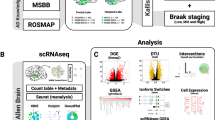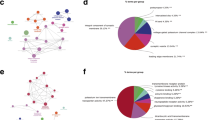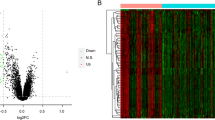Abstract
Alzheimer’s disease (AD) is one of the most common neurodegeneration diseases caused by multiple factors. The mechanistic insight of AD remains limited. To disclose molecular mechanisms of AD, many studies have been proposed from transcriptome analyses. However, no analysis across multiple levels of transcription has been conducted to discover co-expression networks of AD. We performed gene-level and isoform-level analyses of RNA sequencing (RNA-seq) data from 544 brain tissues of AD patients, mild cognitive impaired (MCI) patients, and healthy controls. Gene and isoform levels of co-expression modules were constructed by RNA-seq data. The associations of modules with AD were evaluated by integrating cognitive scores of patients, Genome-wide association studies (GWAS), alternative splicing analysis, and dementia-related genes expressed in brain tissues. Totally, 29 co-expression modules were found with expressions significantly correlated with the cognitive scores. Among them, two isoform modules were enriched with AD-associated SNPs and genes whose mRNA splicing displayed significant alteration in relation to AD disease. These two modules were further found enriched with dementia-related genes expressed in four brain regions of 125 AD patients. Analyzing expressions of these two modules revealed expressions of 39 isoforms (corresponding to 35 genes) significantly correlated with cognitive scores of AD patients, in which 38 isoforms were significantly up-regulated in AD patients comparing to controls, and 33 isoforms (corresponding to 29 genes) were not reported as AD-related previously. Employing the co-expression modules and the drug-induced gene expression data from Connectivity Map (CMAP), 12 drugs were predicted as significant in restoring the gene expression of AD patients towards health, which include nine drugs reported for relieving AD. In comparison, four of the top 12 significant drugs were known for relieving AD if the drug prediction was performed by the genes expressed significantly different in AD and healthy controls. Analysis of multiple levels of the transcriptomic organization is useful in suggesting AD-related co-expression networks and discovering drugs.





Similar content being viewed by others
Data availability
Data were available in the section of results, material and method, and supplemental material.
References
Airavaara M et al (2011) Identification of novel GDNF isoforms and cis-antisense GDNFOS gene and their regulation in human middle temporal gyrus of Alzheimer disease. J Biol Chem 286:45093–45102. https://doi.org/10.1074/jbc.M111.310250
Aston C, Jiang L, Sokolov BP (2005) Transcriptional profiling reveals evidence for signaling and oligodendroglial abnormalities in the temporal cortex from patients with major depressive disorder. Mol Psychiatry 10:309–322. https://doi.org/10.1038/sj.mp.4001565
Atluri VS et al (2014) Vorinostat positively regulates synaptic plasticity genes expression and spine density in HIV infected neurons: role of nicotine in progression of HIV-associated neurocognitive disorder. Mol Brain 7:37. https://doi.org/10.1186/1756-6606-7-37
Barone E, Butterfield DA (2015) Insulin resistance in Alzheimer disease: Is heme oxygenase-1 an Achille’s heel? Neurobiol Dis 84:69–77. https://doi.org/10.1016/j.nbd.2015.02.013
Benito E et al (2015) HDAC inhibitor-dependent transcriptome and memory reinstatement in cognitive decline models. J Clin Invest 125:3572–3584. https://doi.org/10.1172/JCI79942
Bennett DA, Schneider JA, Arvanitakis Z, Wilson RS (2012) Overview and findings from the religious orders study. Curr Alzheimer Res 9:628–645. https://doi.org/10.2174/156720512801322573
Bertram L et al (2008) Genome-wide association analysis reveals putative Alzheimer’s disease susceptibility loci in addition to APOE. Am J Hum Genet 83:623–632. https://doi.org/10.1016/j.ajhg.2008.10.008
Bihlmeyer NA et al (2019) Novel methods for integration and visualization of genomics and genetics data in Alzheimer’s disease. Alzheimers Dement 15:788–798. https://doi.org/10.1016/j.jalz.2019.01.011
Braggin JE et al (2019) Alternative splicing in a presenilin 2 variant associated with Alzheimer disease. Ann Clin Transl Neurol 6:762–777. https://doi.org/10.1002/acn3.755
Buee L (2019) Dementia Therapy Targeting Tau. Adv Exp Med Biol 1184:407–416. https://doi.org/10.1007/978-981-32-9358-8_30
Chagoyen M, Ranea JAG, Pazos F (2019) Applications of molecular networks in biomedicine. Biol Methods Protoc 4:bpz02. https://doi.org/10.1093/biomethods/bpz012
Chung J et al (2018) Genome-wide association study of Alzheimer’s disease endophenotypes at prediagnosis stages. Alzheimers Dement 14:623–633. https://doi.org/10.1016/j.jalz.2017.11.006
Del-Aguila JL et al (2019) TREM2 brain transcript-specific studies in AD and TREM2 mutation carriers. Mol Neurodegener 14:18. https://doi.org/10.1186/s13024-019-0319-3
Drewes G et al (1995) Microtubule-associated protein/microtubule affinity-regulating kinase (p110mark). A novel protein kinase that regulates tau-microtubule interactions and dynamic instability by phosphorylation at the Alzheimer-specific site serine 262. J Biol Chem 270:7679–7688. https://doi.org/10.1074/jbc.270.13.7679
Durinck S et al (2005) BioMart and Bioconductor: a powerful link between biological databases and microarray data analysis. Bioinformatics 21:3439–3440. https://doi.org/10.1093/bioinformatics/bti525
Durinck S, Spellman PT, Birney E, Huber W (2009) Mapping identifiers for the integration of genomic datasets with the R/Bioconductor package biomaRt. Nat Protoc 4:1184–1191. https://doi.org/10.1038/nprot.2009.97
Erwig MS et al (2019) Anillin facilitates septin assembly to prevent pathological outfoldings of central nervous system myelin. Elife. https://doi.org/10.7554/eLife.43888
Francis PT (2008) Glutamatergic approaches to the treatment of cognitive and behavioural symptoms of Alzheimer’s disease. Neurodegener Dis 5:241–243. https://doi.org/10.1159/000113713
Fu C et al (2015) Inositol hexakisphosphate kinase-3 regulates the morphology and synapse formation of cerebellar purkinje cells via spectrin/adducin. J Neurosci 35:11056–11067. https://doi.org/10.1523/JNEUROSCI.1069-15.2015
Gadea G, Blangy A (2014) Dock-family exchange factors in cell migration and disease. Eur J Cell Biol 93:466–477. https://doi.org/10.1016/j.ejcb.2014.06.003
Gandal MJ et al (2018) Transcriptome-wide isoform-level dysregulation in ASD, schizophrenia, and bipolar disorder. Science. https://doi.org/10.1126/science.aat8127
Gerstung M et al (2015) Combining gene mutation with gene expression data improves outcome prediction in myelodysplastic syndromes. Nat Commun 6:5901. https://doi.org/10.1038/ncomms6901
Harold D et al (2009) Genome-wide association study identifies variants at CLU and PICALM associated with Alzheimer’s disease. Nat Genet 41:1088–1093. https://doi.org/10.1038/ng.440
Hollingworth P et al (2011) Common variants at ABCA7, MS4A6A/MS4A4E, EPHA1, CD33 and CD2AP are associated with Alzheimer’s disease. Nat Genet 43:429–435. https://doi.org/10.1038/ng.803
Hong HS et al (2010) FK506 reduces amyloid plaque burden and induces MMP-9 in AbetaPP/PS1 double transgenic mice. J Alzheimers Dis 22:97–105. https://doi.org/10.3233/JAD-2010-100261
Hoodin F et al (2019) Cognitive function and quality of life in vorinostat-treated patients after matched unrelated donor myeloablative conditioning hematopoietic cell transplantation. Biol Blood Marrow Transplant 25:343–353. https://doi.org/10.1016/j.bbmt.2018.09.015
Hu Y et al (2019) A statistical framework for cross-tissue transcriptome-wide association analysis. Nat Genet 51:568–576. https://doi.org/10.1038/s41588-019-0345-7
Huang LK, Chao SP, Hu CJ (2020) Clinical trials of new drugs for Alzheimer disease. J Biomed Sci 27:18. https://doi.org/10.1186/s12929-019-0609-7
Ito H et al (2009) Sept8 controls the binding of vesicle-associated membrane protein 2 to synaptophysin. J Neurochem 108:867–880. https://doi.org/10.1111/j.1471-4159.2008.05849.x
Jack CR Jr et al (2011) Introduction to the recommendations from the National Institute on Aging-Alzheimer’s Association workgroups on diagnostic guidelines for Alzheimer’s disease. Alzheimers Dement 7:257–262. https://doi.org/10.1016/j.jalz.2011.03.004
Jansen IE et al (2019) Genome-wide meta-analysis identifies new loci and functional pathways influencing Alzheimer’s disease risk. Nat Genet 51:404–413. https://doi.org/10.1038/s41588-018-0311-9
Johnson MR et al (2015) Systems genetics identifies Sestrin 3 as a regulator of a proconvulsant gene network in human epileptic hippocampus. Nat Commun 6:6031. https://doi.org/10.1038/ncomms7031
Jun G et al (2014) PLXNA4 is associated with Alzheimer disease and modulates tau phosphorylation. Ann Neurol 76:379–392. https://doi.org/10.1002/ana.24219
Khakh BS et al (2017) Unravelling and exploiting astrocyte dysfunction in Huntington’s disease. Trends Neurosci 40:422–437. https://doi.org/10.1016/j.tins.2017.05.002
Kilgore M et al (2010) Inhibitors of class 1 histone deacetylases reverse contextual memory deficits in a mouse model of Alzheimer’s disease. Neuropsychopharmacology 35:870–880. https://doi.org/10.1038/npp.2009.197
Kim J et al (2018) Rnf220 cooperates with Zc4h2 to specify spinal progenitor domains. Development. https://doi.org/10.1242/dev.165340
Koch L (2018) Altered splicing in Alzheimer transcriptomes. Nat Rev Genet 19:738–739. https://doi.org/10.1038/s41576-018-0064-4
Kumar A, Singh N (2017) Calcineurin inhibitors improve memory loss and neuropathological changes in mouse model of dementia. Pharmacol Biochem Behav 153:147–159. https://doi.org/10.1016/j.pbb.2016.12.018
Kunkle BW et al (2019) Genetic meta-analysis of diagnosed Alzheimer’s disease identifies new risk loci and implicates Abeta, tau, immunity and lipid processing. Nat Genet 51:414–430. https://doi.org/10.1038/s41588-019-0358-2
Laaniste L et al (2019) Integrated systems-genetic analyses reveal a network target for delaying glioma progression. Ann Clin Transl Neurol 6:1616–1638. https://doi.org/10.1002/acn3.50850
Lake BB et al (2016) Neuronal subtypes and diversity revealed by single-nucleus RNA sequencing of the human brain. Science 352:1586–1590. https://doi.org/10.1126/science.aaf1204
Lamb J et al (2006) The Connectivity Map: using gene-expression signatures to connect small molecules, genes, and disease. Science 313:1929–1935. https://doi.org/10.1126/science.1132939
Lambert JC et al (2009) Genome-wide association study identifies variants at CLU and CR1 associated with Alzheimer’s disease. Nat Genet 41:1094–1099. https://doi.org/10.1038/ng.439
Lambert JC et al (2013) Meta-analysis of 74,046 individuals identifies 11 new susceptibility loci for Alzheimer’s disease. Nat Genet 45:1452–1458. https://doi.org/10.1038/ng.2802
Langfelder P, Horvath S (2008) WGCNA: an R package for weighted correlation network analysis. BMC Bioinform 9:559. https://doi.org/10.1186/1471-2105-9-559
Langfelder P, Horvath S (2012) Fast R functions for robust correlations and hierarchical clustering. J Stat Softw 46(11):i11
Lee C et al (2016) An isoform-specific role of FynT tyrosine kinase in Alzheimer’s disease. J Neurochem 136:637–650. https://doi.org/10.1111/jnc.13429
Li YI et al (2018a) Annotation-free quantification of RNA splicing using LeafCutter. Nat Genet 50:151–158. https://doi.org/10.1038/s41588-017-0004-9
Li W et al (2018b) Neuronal adaptor FE65 stimulates Rac1-mediated neurite outgrowth by recruiting and activating ELMO1. J Biol Chem 293:7674–7688. https://doi.org/10.1074/jbc.RA117.000505
Lin F et al (2017) Insula and inferior frontal gyrus’ activities protect memory performance against alzheimer’s disease pathology in old age. J Alzheimers Dis 55:669–678. https://doi.org/10.3233/JAD-160715
Lindahl B, Eriksson L, Spillmann D, Caterson B, Lindahl U (1996) Selective loss of cerebral keratan sulfate in Alzheimer’s disease. J Biol Chem 271:16991–16994. https://doi.org/10.1074/jbc.271.29.16991
Love MI, Huber W, Anders S (2014) Moderated estimation of fold change and dispersion for RNA-seq data with DESeq2. Genome Biol 15:550. https://doi.org/10.1186/s13059-014-0550-8
Mills JD et al (2013) RNA-Seq analysis of the parietal cortex in Alzheimer’s disease reveals alternatively spliced isoforms related to lipid metabolism. Neurosci Lett 536:90–95. https://doi.org/10.1016/j.neulet.2012.12.042
Morikawa M, Tanaka Y, Cho HS, Yoshihara M, Hirokawa N (2018) The Molecular Motor KIF21B Mediates Synaptic Plasticity and Fear Extinction by Terminating Rac1 Activation. Cell Rep 23:3864–3877. https://doi.org/10.1016/j.celrep.2018.05.089
Naj AC et al (2011) Common variants at MS4A4/MS4A6E, CD2AP, CD33 and EPHA1 are associated with late-onset Alzheimer’s disease. Nat Genet 43:436–441. https://doi.org/10.1038/ng.801
Ng LF et al (2014) The mitochondria-targeted antioxidant MitoQ extends lifespan and improves healthspan of a transgenic Caenorhabditis elegans model of Alzheimer disease. Free Radic Biol Med 71:390–401. https://doi.org/10.1016/j.freeradbiomed.2014.03.003
Olive M et al (2009) TAR DNA-Binding protein 43 accumulation in protein aggregate myopathies. J Neuropathol Exp Neurol 68:262–273. https://doi.org/10.1097/NEN.0b013e3181996d8f
O’Neal MA, Stallings NR, Malter JS (2018) Alzheimer’s Disease, Dendritic Spines, and Calcineurin Inhibitors: A New Approach? ACS Chem Neurosci 9:1233–1234. https://doi.org/10.1021/acschemneuro.8b00213
Pinero J et al (2020) The DisGeNET knowledge platform for disease genomics: 2019 update. Nucleic Acids Res 48:D845–D855. https://doi.org/10.1093/nar/gkz1021
Pitts MW et al (2012) Deletion of selenoprotein P results in impaired function of parvalbumin interneurons and alterations in fear learning and sensorimotor gating. Neuroscience 208:58–68. https://doi.org/10.1016/j.neuroscience.2012.02.017
Pong K, Zaleska MM (2003) Therapeutic implications for immunophilin ligands in the treatment of neurodegenerative diseases. Curr Drug Targets CNS Neurol Disord 2:349–356. https://doi.org/10.2174/1568007033482652
Pottier C et al (2016) TYROBP genetic variants in early-onset Alzheimer’s disease. Neurobiol Aging 48(222):e229-222e215. https://doi.org/10.1016/j.neurobiolaging.2016.07.028
Preti MG et al (2011) Comparison between skeleton-based and atlas-based approach in the assessment of corpus callosum damages in Mild Cognitive Impairment and Alzheimer Disease. Conf Proc IEEE Eng Med Biol Soc 7808–7811:2011. https://doi.org/10.1109/IEMBS.2011.6091924
Purcell S et al (2007) PLINK: a tool set for whole-genome association and population-based linkage analyses. Am J Hum Genet 81:559–575. https://doi.org/10.1086/519795
Ruzzo EK et al (2019) Inherited and de novo genetic risk for autism impacts shared networks. Cell 178:850-866e826. https://doi.org/10.1016/j.cell.2019.07.015
Sah RK et al (2019) Transcriptome profiling of mouse brain and lung under Dip2a regulation using RNA-sequencing. PLoS One 14:e0213702. https://doi.org/10.1371/journal.pone.0213702
Scheff SW, Price DA, Schmitt FA, Scheff MA, Mufson EJ (2011) Synaptic loss in the inferior temporal gyrus in mild cognitive impairment and Alzheimer’s disease. J Alzheimers Dis 24:547–557. https://doi.org/10.3233/JAD-2011-101782
Schneider JA, Gearing M, Robbins RS, de l’Aune, W. & Mirra, S. S. (1995) Apolipoprotein E genotype in diverse neurodegenerative disorders. Ann Neurol 38:131–135. https://doi.org/10.1002/ana.410380122
Schon EA, Area-Gomez E (2013) Mitochondria-associated ER membranes in Alzheimer disease. Mol Cell Neurosci 55:26–36. https://doi.org/10.1016/j.mcn.2012.07.011
Seshadri S et al (2010) Genome-wide analysis of genetic loci associated with Alzheimer disease. JAMA 303:1832–1840. https://doi.org/10.1001/jama.2010.574
Shanmuganathan B, Sathya S, Balasubramaniam B, Balamurugan K, Devi KP (2019) Amyloid-beta induced neuropathological actions are suppressed by Padina gymnospora (Phaeophyceae) and its active constituent alpha-bisabolol in Neuro2a cells and transgenic Caenorhabditis elegans Alzheimer’s model. Nitric Oxide 91:52–66. https://doi.org/10.1016/j.niox.2019.07.009
Shin JH et al (2019) Down-regulated TMED10 in Alzheimer disease induces autophagy via ATG4B activation. Autophagy 15:1495–1505. https://doi.org/10.1080/15548627.2019.1586249
Shonesy BC et al (2012) Central insulin resistance and synaptic dysfunction in intracerebroventricular-streptozotocin injected rodents. Neurobiol Aging 33(430):e435–e418. https://doi.org/10.1016/j.neurobiolaging.2010.12.002
Sihlbom C, Davidsson P, Sjogren M, Wahlund LO, Nilsson CL (2008) Structural and quantitative comparison of cerebrospinal fluid glycoproteins in Alzheimer’s disease patients and healthy individuals. Neurochem Res 33:1332–1340. https://doi.org/10.1007/s11064-008-9588-x
Sun L et al (2020) MiR-107 overexpression attenuates neurotoxicity induced by 6-hydroxydopamine both in vitro and in vivo. Chem Biol Interact 315:108908. https://doi.org/10.1016/j.cbi.2019.108908
Tapella L et al (2018) TGF-beta2 and TGF-beta3 from cultured beta-amyloid-treated or 3xTg-AD-derived astrocytes may mediate astrocyte-neuron communication. Eur J Neurosci 47:211–221. https://doi.org/10.1111/ejn.13819
Tasaka G, Negishi M, Oinuma I (2012) Semaphorin 4D/Plexin-B1-mediated M-Ras GAP activity regulates actin-based dendrite remodeling through Lamellipodin. J Neurosci 32:8293–8305. https://doi.org/10.1523/JNEUROSCI.0799-12.2012
Wang M et al (2016) Integrative network analysis of nineteen brain regions identifies molecular signatures and networks underlying selective regional vulnerability to Alzheimer’s disease. Genome Med 8:104. https://doi.org/10.1186/s13073-016-0355-3
Wijsman EM et al (2011) Genome-wide association of familial late-onset Alzheimer’s disease replicates BIN1 and CLU and nominates CUGBP2 in interaction with APOE. PLoS Genet 7:e1001308. https://doi.org/10.1371/journal.pgen.1001308
Wilcock DM, Vitek MP, Colton CA (2009) Vascular amyloid alters astrocytic water and potassium channels in mouse models and humans with Alzheimer’s disease. Neuroscience 159:1055–1069. https://doi.org/10.1016/j.neuroscience.2009.01.023
Wyler SC, Donovan LJ, Yeager M, Deneris E (2015) Pet-1 controls tetrahydrobiopterin pathway and Slc22a3 transporter genes in serotonin neurons. ACS Chem Neurosci 6:1198–1205. https://doi.org/10.1021/cn500331z
Xu M, Xiao M, Li S, Yang B (2017) Aquaporins in nervous system. Adv Exp Med Biol 969:81–103. https://doi.org/10.1007/978-94-024-1057-0_5
Xu XF, Wang YC, Zong L, Chen ZY, Li Y (2018) Elevating Integrin-linked Kinase expression has rescued hippocampal neurogenesis and memory deficits in an AD animal model. Brain Res 1695:65–77. https://doi.org/10.1016/j.brainres.2018.05.024
Yu G, Wang LG, Han Y, He QY (2012) clusterProfiler: an R package for comparing biological themes among gene clusters. OMICS 16:284–287. https://doi.org/10.1089/omi.2011.0118
Yu L et al (2017) Association between brain gene expression, DNA methylation, and alteration of ex vivo magnetic resonance imaging transverse relaxation in late-life cognitive decline. JAMA Neurol 74:1473–1480. https://doi.org/10.1001/jamaneurol.2017.2807
Zhang B et al (2013) Integrated systems approach identifies genetic nodes and networks in late-onset Alzheimer’s disease. Cell 153:707–720. https://doi.org/10.1016/j.cell.2013.03.030
Zhang Z et al (2017) Deficiency of a sulfotransferase for sialic acid-modified glycans mitigates Alzheimer’s pathology. Proc Natl Acad Sci USA 114:E2947–E2954. https://doi.org/10.1073/pnas.1615036114
Zhang X et al (2019) Cell Marker: a manually curated resource of cell markers in human and mouse. Nucleic Acids Res 47:D721–D728. https://doi.org/10.1093/nar/gky900
Funding
We thank for the Natural Science Foundation of China (81801132, and 81971190), the program for Guangdong Introducing Innovative and Enterpreneurial Teams (2016ZT06D211), Guangdong Province Key Laboratory of Malignant Tumor Epigenetics and GeneRegulation (2017B030314026) and the Science and Technology Program of Guangzhou, China (20170402022 and 201904020008).
Author information
Authors and Affiliations
Corresponding author
Ethics declarations
Conflict of interest
The authors declare no conflicts of interest.
Ethics approval
The authors confirm that this work is original and neither has been published elsewhere nor is it currently under consideration for publication elsewhere.
Consent to participate
All the authors agreed with the content of this manuscript.
Consent for publication
All the authors agreed that this manuscript be submitted to the journal of Human Genetics for publication.
Additional information
Publisher's Note
Springer Nature remains neutral with regard to jurisdictional claims in published maps and institutional affiliations.
Electronic supplementary material
Below is the link to the electronic supplementary material.
Rights and permissions
About this article
Cite this article
Fan, C., Chen, K., Zhou, J. et al. Systematic analysis to identify transcriptome-wide dysregulation of Alzheimer’s disease in genes and isoforms. Hum Genet 140, 609–623 (2021). https://doi.org/10.1007/s00439-020-02230-7
Received:
Accepted:
Published:
Issue Date:
DOI: https://doi.org/10.1007/s00439-020-02230-7




